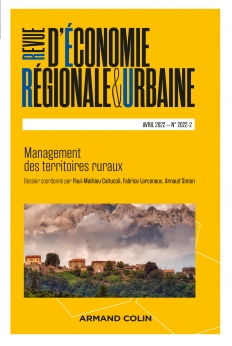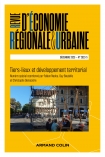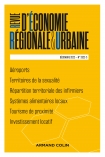
REVUE D'ÉCONOMIE RÉGIONALE ET URBAINE (2/2022)
Pour acheter ce numéro, contactez-nous
Recevez les numéros de l'année en cours et accédez à l'intégralité des articles en ligne.
Cet article porte sur un Land rural du nord-est de l’Allemagne, à la fois concerné par un héritage socialiste et des logiques de périphérisation, définie comme les effets conjoints de départs de population, décrochage économique, dépendance politique et stigmatisation. L’article examine dans quelle mesure ces facteurs sont déterminants dans la capacité de ce Land à mobiliser LEADER. À travers l’analyse de trois régions LEADER, il pose l’hypothèse d’une inadéquation entre le programme et les territoires étudiés, en ce que les régions combinant trop de difficultés ne sont pas aptes à s’en saisir. En effet, la compétition entre régions accroît les inégalités entre mais également au sein de celles-ci. Après une étude des différents profils d’acteurs de LEADER dans les régions d’étude, les stratégies de contournement et d’instrumentalisation des règles du programme sont mises en évidence.
The article focuses on the European rural development program LEADER and its implementation in former GDR rural areas. The three studied regions are affected both by the heritage of the socialist era and peripheralization, defined as a combination of population departures, economic weakening, political dependence and stigmatization. The article questions the extent to which these factors might prevent local stakeholders from getting involved in the LEADER European development program. It is here assumed that the program is inadequate for the targeted regions, as the most disadvantaged regions, which would particularly need the program, are the least able to use LEADER as an instrument of development. They have to face difficulties in too many fields to implement concrete and efficient endogenous development strategies. The interregional competition increases therefore inequalities between disadvantaged regions and the prosperous ones. After a study of several profiles of stakeholders in the studied regions, showing different level of involvement, the strategies of circumvention and instrumentalization of the program’s rules are highlighted. A particular attention is paid to the financial rules of the LEADER regions and how they tend to increase inequalities between regions but also between small cities within those regions. The role of personal acquaintances is also pointed out as a significant advantage. The methodological framework is a mix of qualitative methods including repeated semi-directive interviews with regional managers, observation of rural development reunions, as well as analysis of the development strategies. This fieldwork took place over several months in 2018 and 2019 in three LEADER regions of Mecklenburg-West-Pomerania.

